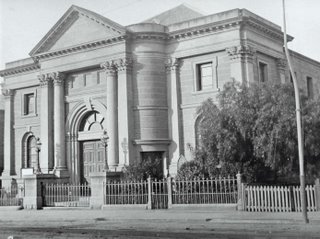
His most well-known sermon series came about in a unique way. He tells it best. If you're able, secure a copy of A Temple of Topaz and you shall find printed there, in the foreword, these words:
"One Sunday evening...I was standing in my pulpit in Hobart, Tasmania. The occasion was special and the church was crowded. I was commencing that night my Winter Series of Addresses. The addresses, as the printed syllabus showed, were to be delivered at fortnightly intervals. During the hymn before the announcements, I was deliberating on the precise phraseology in which I should refer to the course on which I was embarking. It suddenly flashed upon me that, by emphasizing the address that was to be delivered a fortnight hence, I was virtually inviting the more casual members of the congregation to absent themselves on the following Sunday. Could I not say a word that would make the intervening Sundays attractive? It happened that, during the week, I had been reading the Life of Luther, and had been impressed by the way in which the Reformation sprang from a single text."
"Whilst I was still engrossed in this brown study, the hymn came to an end and the people resumed their seats. I announced my fortnightly addresses according to the printed syllabus; and then astonished myself by intimating that, on the following Sunday evening, I should commence an alternating series of fortnightly addresses entitled Texts That Made History. 'Next Sunday evening,' I added with extraordinary temerity, 'I shall deal with Martin Luther's Text!'
"At the close of the service, one of my most trusted officers came to me in great delight.’That's a noble idea,' he exclaimed enthusiastically; 'it will be the best series that you have ever preached!' It has certainly been the longest, and the most evangelistic, and the most effective. And it has been the series in which I myself have found the most delight."
This series is composed of 125 messages Boreham delivered on fortnightly Sunday evenings. As a result of these compelling messages, scores of people placed their trust in the Saviour. Kregel Publishing in Grand Rapids, Michigan, has recently reprinted these addresses. Included are the salvation accounts, with the Scripture texts God used, of such notable figures as Abraham Lincoln, Catherine Booth, John Wesley, Robinson Crusoe, Blaise Pascal, John Milton, David Brainerd, William Penn, and Everybody's Text (Jn. 3:16). These delightful histories are readily available and should be in every minister's library.
Jeff Cranston
Image: The Hobart Baptist Tabernacle. Photo taken in the Boreham era by FWB. It is a huge auditorium and was regularly packed out in Boreham's ministry (GP).
 Perhaps one of the greatest gifts Boreham shares with preachers is his ability of story-telling. For those of us who stand in the pulpit on a weekly basis, we know the necessity of being able to communicate interesting stories.
Perhaps one of the greatest gifts Boreham shares with preachers is his ability of story-telling. For those of us who stand in the pulpit on a weekly basis, we know the necessity of being able to communicate interesting stories.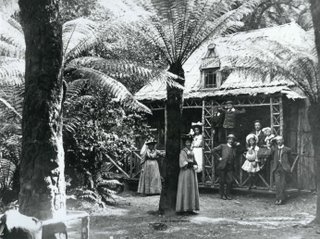
 His most well-known sermon series came about in a unique way. He tells it best. If you're able, secure a copy of A Temple of Topaz and you shall find printed there, in the foreword, these words:
His most well-known sermon series came about in a unique way. He tells it best. If you're able, secure a copy of A Temple of Topaz and you shall find printed there, in the foreword, these words: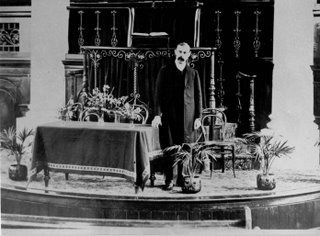
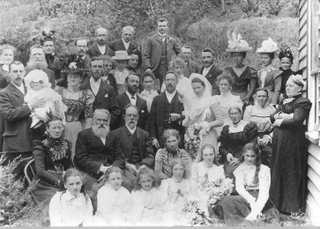

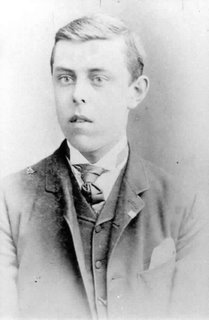 "For all of his life, he was a person apart. His Saviour was all important to him." So runs the descriptive phrase of a son about his father. The son is Frank Boreham, Jr. and his father is the man I wish for you to meet.
"For all of his life, he was a person apart. His Saviour was all important to him." So runs the descriptive phrase of a son about his father. The son is Frank Boreham, Jr. and his father is the man I wish for you to meet. Many readers of this blogsite have a long term interest in the life and writings of F W Boreham. I have received, however, one or two letters from readers who have little acquaintance with Boreham’s life. I thought it would be good to offer an overview of the life and ministry of Dr Boreham. To present this I have sought and gained permission from Dr Jeff Cranston, to republish a fine article he wrote for Preaching Magazine in Winter 1998.
Many readers of this blogsite have a long term interest in the life and writings of F W Boreham. I have received, however, one or two letters from readers who have little acquaintance with Boreham’s life. I thought it would be good to offer an overview of the life and ministry of Dr Boreham. To present this I have sought and gained permission from Dr Jeff Cranston, to republish a fine article he wrote for Preaching Magazine in Winter 1998.